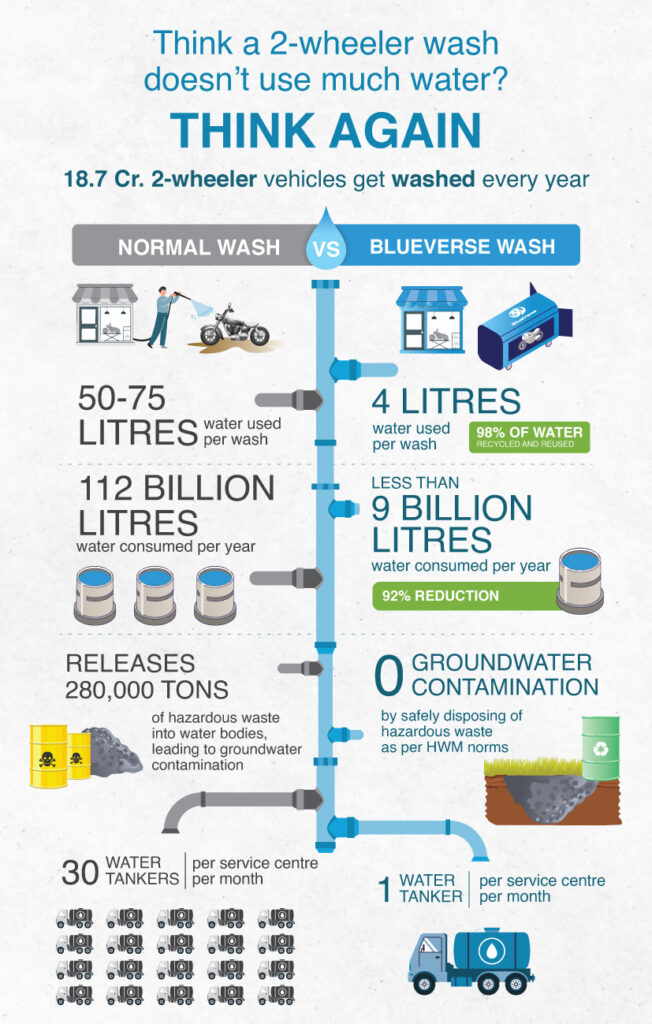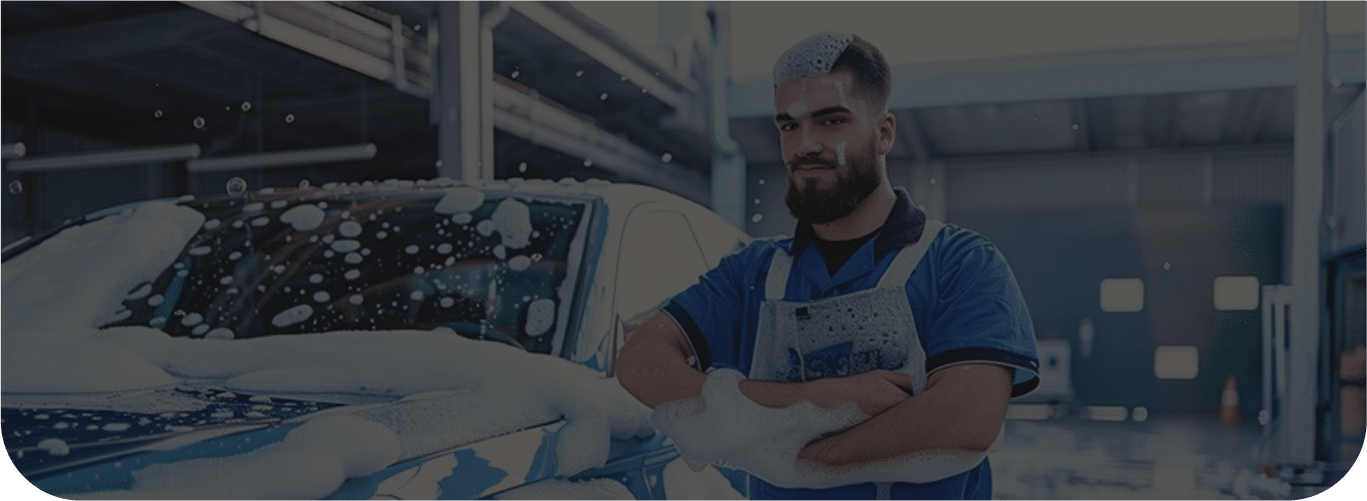Table of Contents
Today, India is already in a very critical situation with water scarcity in its cities. This is so because the availability of water has become a major issue over the years through population explosion, change of weather patterns and increase in urbanization. NITI Aayog has stated that water stress is rapidly emerging as a challenge in 21 of India’s largest cities including Bengaluru, Hyderabad, Chennai, Delhi etc.
Due to this, various sectors like vehicle washing have to switch to measures to conserve water immediately. In this circumstance, to have an environmentally friendly city, it became a necessity that care should be taken while washing the vehicles.
The Problem with Traditional Vehicle Washing
1. Water Waste and Pollution from Conventional Methods
The traditional way of washing vehicles using water is widely recognized. Using a hose, a typical vehicle wash typically requires between 100 and 200 liters of water. The combined waste of water is significant when considering the countless number of vehicles in cities. Moreover, conventional vehicle washing often utilizes harsh detergents and chemicals that seep into the drainage system, causing water pollution. Besides the cleaning agents, this runoff also carries oil, grease, and other vehicle contaminants that could greatly affect groundwater and nearby water sources.
2. Environmental Impacts of Vehicle Washing
Cleaning detergents containing harmful substances, which can harm nearby marine organisms and ecosystems, are used in conventional methods of vehicle washing. Additionally, the soil may be contaminated by the runoff from washing automobiles, reducing soil fertility and hindering plant growth. Due to contact with these chemicals, both the general public and employees of vehicle wash facilities may develop respiratory issues, skin irritations, and other health issues.
Eco-Friendly Vehicle Washing Solutions
Introduction to Water-Efficient Vehicle Washing Technologies
Technologies for vehicle washing have evolved where one can use new methods that minimize use of water and or have minimal effects on the environment. Among these solutions are the waterless vehicle wash products that employ special cleaning substances to encapsulate the dirt particles in order to be wiped off with a soft cloth, usually microfiber. The second improvement is that the automated vehicle wash systems utilize accurate water jets and pressure controlled nozzles that spray water and use only 40 liters of water per wash. There are integrated water recycling technologies with such systems that result in the overall extreme reduction of water usage while nearly 98% of the used water is being effectively reclaimed and reused.
Benefits of Using Recycled Water in Vehicle Washes
While waterless vehicle washing is convenient and beneficial for the environment, it also has certain drawbacks. This method may not be ideal for vehicles that are covered in tough dirt and grime because it may not be able to adequately remove it. Chemicals can put the paint on the vehicle and the surrounding environment in danger, leading to surface scratches and runoff pollution. Finally, using the wrong method can lead to insufficient cleaning and possible harm to the vehicle’s surface.
Using recycled water for washing vehicles provides many advantages. It protects vital freshwater supplies, especially in regions facing water scarcity. It also decreases the volume of wastewater needing treatment, lessening the load on municipal water treatment plants. Furthermore, recycled water systems often clean the water used in future washes by eliminating harmful contaminants. Mineral deposits and corrosion are less apt to develop in pure water, enhancing the lifespan and visual appeal of vehicles and safeguarding the environment.
BlueVerse’s Role in Eco-Friendly Vehicle Washing
BlueVerse is at the forefront of providing environmentally friendly vehicle wash options in India. Their advanced vehicle washing tools are eco-friendly, conserving water and having minimal environmental impact while providing a high-quality clean. By using IoT-enabled systems, BlueVerse’s technology guarantees that every wash is comprehensive and efficient, using only four liters of water per wash and recycling and reusing up to 98% of it.
BlueVerse ensures that their washes are safe for vehicles and the environment by following CPCB guidelines and using chemicals that break down in the environment. Their fully automated systems promise a wash of high quality in just six minutes, have a small operational footprint, and take up less than 150 square feet to set up and run.

Implementing Eco-Friendly Practices
Steps to Transition to Eco-Friendly Vehicle Washing
A methodical approach is required to make the switch to eco-friendly vehicle washing. First, vehicle washing businesses should look at how much water they use and figure out where they can use less. It is essential to make an investment in cutting-edge vehicle washing machines that save water. This includes products for waterless vehicle washing as well as automated systems that can recycle water.
Tips for Vehicle Wash Businesses and Vehicle Owners
For vehicle wash businesses:
- Invest in Water-Efficient Technologies: Set up automated systems that use as little water as possible and include features that recycle water.
- Choose cleaners that are safe for the environment and adhere to regulatory standards by using biodegradable chemicals.
- Staff Training: Inform employees about water conservation and eco-friendly washing methods.
For vehicle owners:
- Choose Eco-Friendly Vehicle Washes: Visit vehicle wash facilities that use biodegradable cleaning agents and water-efficient technologies.
- Consider using waterless vehicle wash products at home for light cleaning. Adopt waterless washing methods.
- Regularly cleaning and maintaining your vehicle can prevent the need for extensive washing due to dirt and contaminants buildup.
Conclusion
Water-scarce Indian cities must adopt environmentally friendly vehicle washing methods. BlueVerse’s innovative solutions are a model for environmentally friendly vehicle washing that strike a balance between the need for cleanliness and the urgency of conserving water. Businesses that offer vehicle washing solutions and individuals who own vehicles can make a contribution to a sustainable future by adopting these practices. By doing so, we can ensure that water resources will be preserved for future generations.
The automated vehicle washing system offered by BlueVerse. It remains the top choice for deep cleaning, particularly when handling stubborn dirt and grime. Our state-of-the-art, environmentally friendly technology guarantees a clean vehicle and a more eco-conscious tomorrow when compared to traditional dry cleaning methods.
Explore our solutions and collaborate with us to develop sustainable alternatives.



